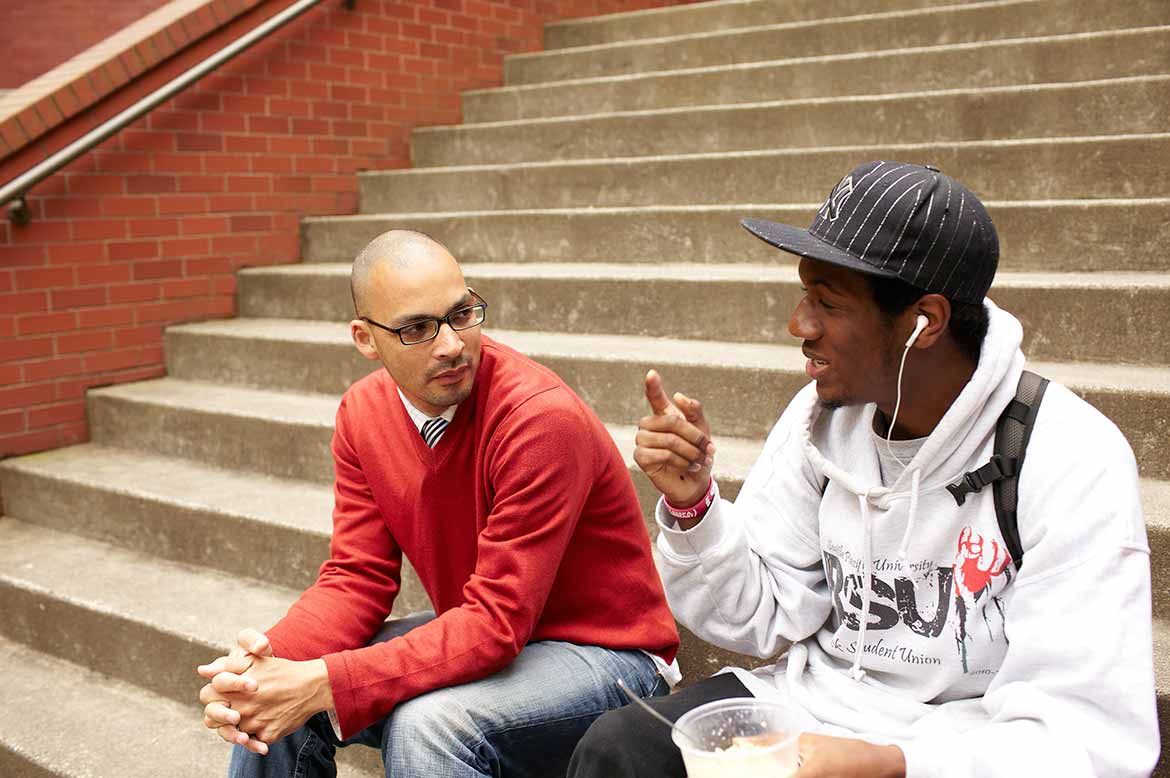
Junior Dre Anderson, right, has had several discussions with Brian Bantum about the Bible, faith, and race. "He helps me remember that I'm not alone," Dre says.
Brian Bantum is the author of Redeeming Mulatto: A Theology of Race and Christian Hybridity. Follow his blog at brianbantum.wordpress.com.
As a professor and theologian, I have often been asked why so much of my teaching brings up questions of race. "Doesn't all of this attention on race take attention away from us reflecting on Jesus," they inquire. Of course, I can understand their concern. If we are speaking so much about race and difference, how can we focus on Jesus and the fact that his death was for all people?
But for me this distinction is not so neat. As a child of a white mother and a black father, I saw race as an ever-present fact of my life, and also a point of perpetual confusion. To whom did I belong? Who belonged to me? In these questions I was confronted with one certain fact, I was not white. At the age of 12, my soft, straight, brown hair turned curly and coarser. I discovered that the world still saw color, my color, even if it was ambiguous and in-between.
Becoming a Christian a few years later, I did not see my race disappear, but become layered upon in this new thing called discipleship. Entering the brave new world of college (a Christian college at that!) I discovered friendship and romance to still be indelibly marked by race. Somehow these distinctions remained unchanged by Jesus' presence in the world.
But it was also in college that I came to discover that Christ had everything to do with race, with me. It began in an African-American history course reading W.E.B. Du Bois' (an African-American sociologist) The Souls of Black Folk and reading a question implicitly posed to him, "How does it feel to be a problem?" At this moment I came to understand how my biracial body was not only a problem for me, but also for the world as well. How can a world that presupposes race is a pure, natural thing, understand a person who stands in between?
But at the same time I came to understand I was bound to the African-American story and reality. I belonged to both my white mother's people and my black father's people in ways that I would just begin to understand. To be a "problem" was not about my inadequacy, but a condition of living in a world marked by race. This tension could not be resolved or eased, but must be lived into.
But it was theology, and theology's expanding of my understanding of Christ, that allowed me to understand that this tension of being a "problem" was not merely an aspect of being racially mixed, but was actually a mark of being a Christian. Reading Epistle to Diognetus, a text read in the first centuries of the church, I was struck by the words "you are a foreigner in every fatherland and in every foreign land you are a citizen." I realized the strangeness of race allowed me to understand the strangeness of discipleship.
To follow Christ, this mysterious union of God and humanity remade me, remade humanity so that all of our particularities (race, gender, gifts, nationality) might glorify and point to Christ. But this reality does draw us into certainty. Our remade bodies make us into "neither/nor" creatures ("You are neither Jew nor Greek …") that occupy a perilous middle space. But in this middle space, I discovered that I am not alone or tragically split in two, but I have become part of a new body, a new people.
Why do I teach theology alongside questions of race and identity? Because God wants all of us.